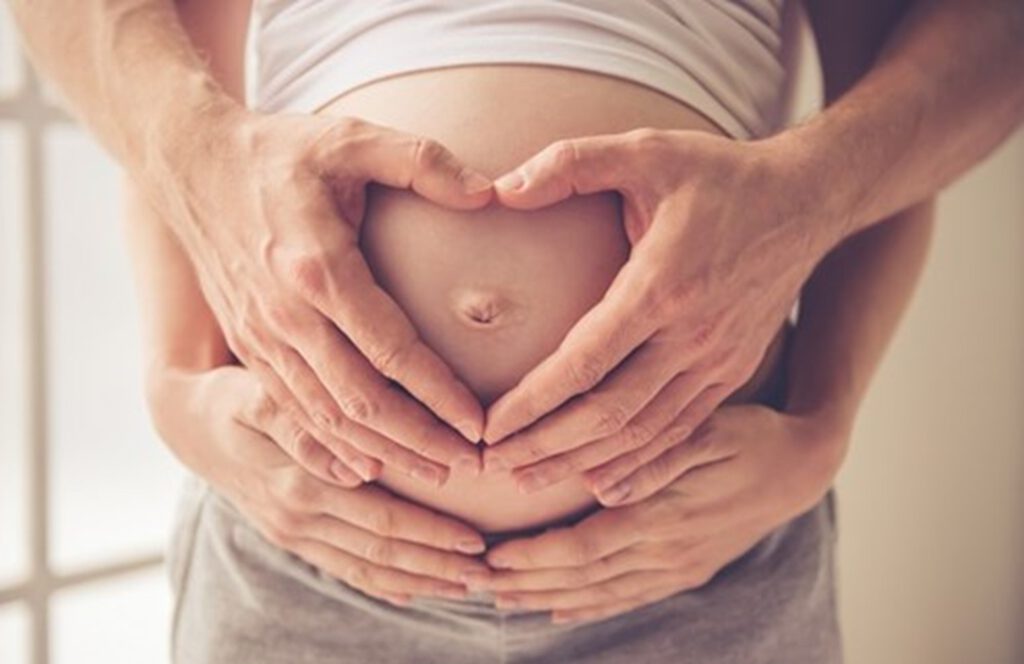Your teeth during pregnancy
It is especially important during pregnancy to take good care of your teeth. Hormonal fluctuations increase the risk of, for example, inflamed gums.

Going to the dentist during your pregnancy
It is important to keep going to the dentist during your pregnancy. Please indicate that you are pregnant. Due to an increased risk, the dentist will postpone some treatments until after the pregnancy. The dentist can advise you on the best way to care for your teeth during pregnancy.
Gingivitis during pregnancy
During pregnancy, hormone levels in the body rise. In some women, this causes the gums to become redder and swollen and to bleed when brushing their teeth. This sensitivity is a hypersensitive reaction to plaque and is caused by an increased level of progesterone in your body. This gum disease during pregnancy is also known as 'pregnancy gingivitis'. This can especially occur between the second and eighth month. Your dentist or dental hygienist can advise you on how to keep your teeth clean with the toothbrush and additional resources and help you prevent further problems.
Premature birth due to periodontitis during pregnancy
Research shows that women with periodontitis (gum disease that also affects the jawbone) have a greater chance of having a preterm child than women without periodontitis. For example, a pregnant woman with periodontitis is two to seven times more likely to have a premature birth or a low birth weight child than a pregnant woman without periodontitis.
If a woman who wishes to become pregnant has gingivitis (gingivitis or periodontitis), it is important to have it treated before the pregnancy. For this reason, it is important to ask your dentist or hygienist to inspect your gums if you want to become pregnant. When periodontitis develops during pregnancy, it is important to have the condition treated before the 28th week. Research among two hundred women has shown that of the women who had their mouth treated before the 28th week, 2 percent had a premature child. Among the women who had not undergone treatment, this was 10 percent. The sooner you treat, the better. However, research also shows that treatment after the 28th week is also possible and is still better than not treating and waiting until after delivery. Even periodontal treatments before the 35th week of pregnancy still have a positive effect on birth weight and time of birth.
What can you do yourself?
Prevent problems and have your teeth checked regularly by your dental care provider. Look out for certain symptoms, such as red and swollen gums, bleeding gums when brushing or eating, loose teeth and receding gums. A bad taste or bad breath can also indicate periodontal disease. If you have these symptoms, ask your dentist for advice. Periodontitis rarely causes pain.
Tips for a healthy mouth during pregnancy
• Brush your teeth twice a day for two minutes with a fluoride toothpaste.
• Clean the space between your teeth daily (preferably in the evening) with toothpicks, brushes or floss.
• Limit the number of eating and drinking moments to 7 per day.
Losing Teeth During Pregnancy
There are rumors that every pregnancy costs one tooth per child. Although, as mentioned, the risk of gum problems is higher, pregnancy does not affect the health of your teeth.
Eating during pregnancy
Because of morning sickness during pregnancy, women generally eat little and often. This increases the chance of cavities because the number of eating moments increases and exceeds seven times a day. Try to stick to regular meals. This has a positive influence on your general health and on the health of your teeth.
Vomiting during pregnancy
In the first months of pregnancy, you may have to vomit because of morning sickness. And while you're probably tempted to brush your teeth right away, it's best to wait. The stomach acid makes the enamel fragile. By brushing immediately, you are more likely to brush away the enamel. It is therefore better to rinse your mouth well with water or a fluoride mouthwash.
X-rays during pregnancy
In dentistry, only X-rays are taken of the teeth or jaw. The radiation therefore does not reach the unborn child. For this reason, dental X-rays during pregnancy can in principle be taken without objection. However, if your dentist knows you are pregnant, he will only take pictures in the most necessary cases.
Source: KNMT, All about the teeth
Come visit us!
- info@mondzorg-valerius.nl
- +31 0 70 870 1466
- Valeriusstraat 25, 2517 HM The Hague